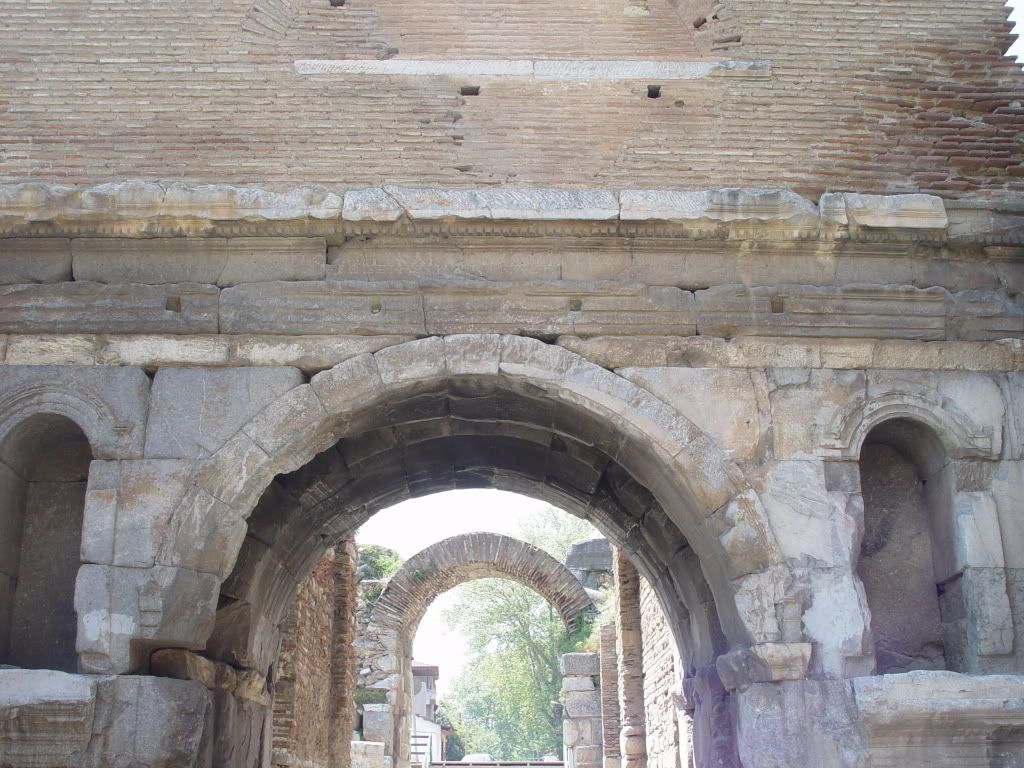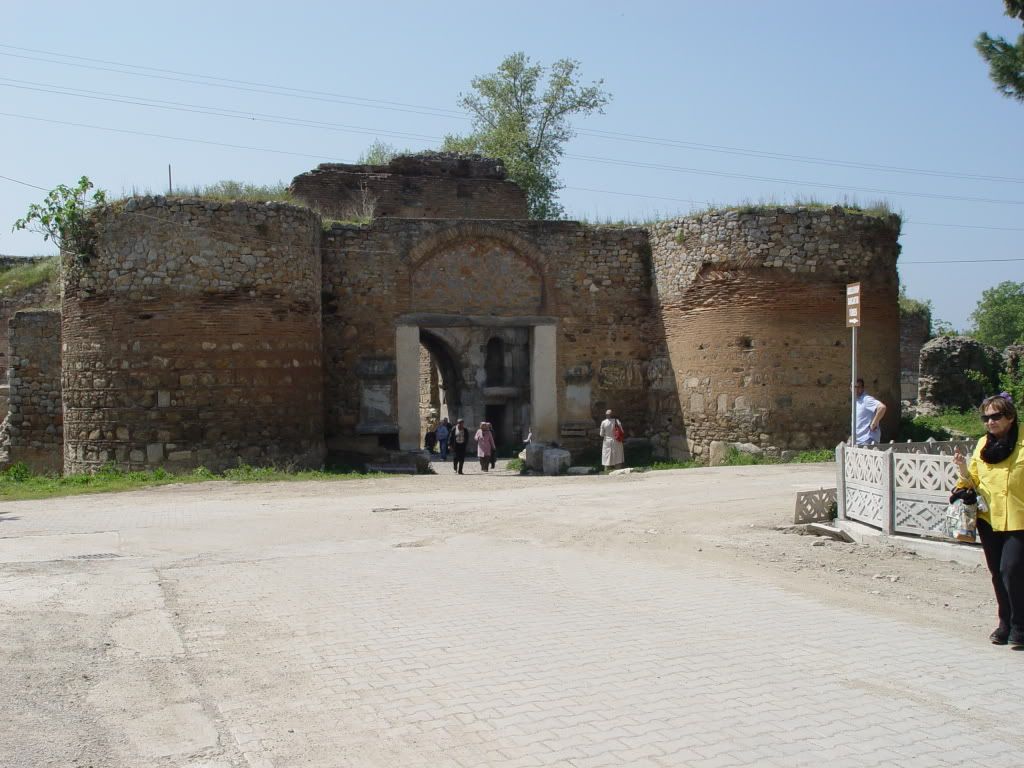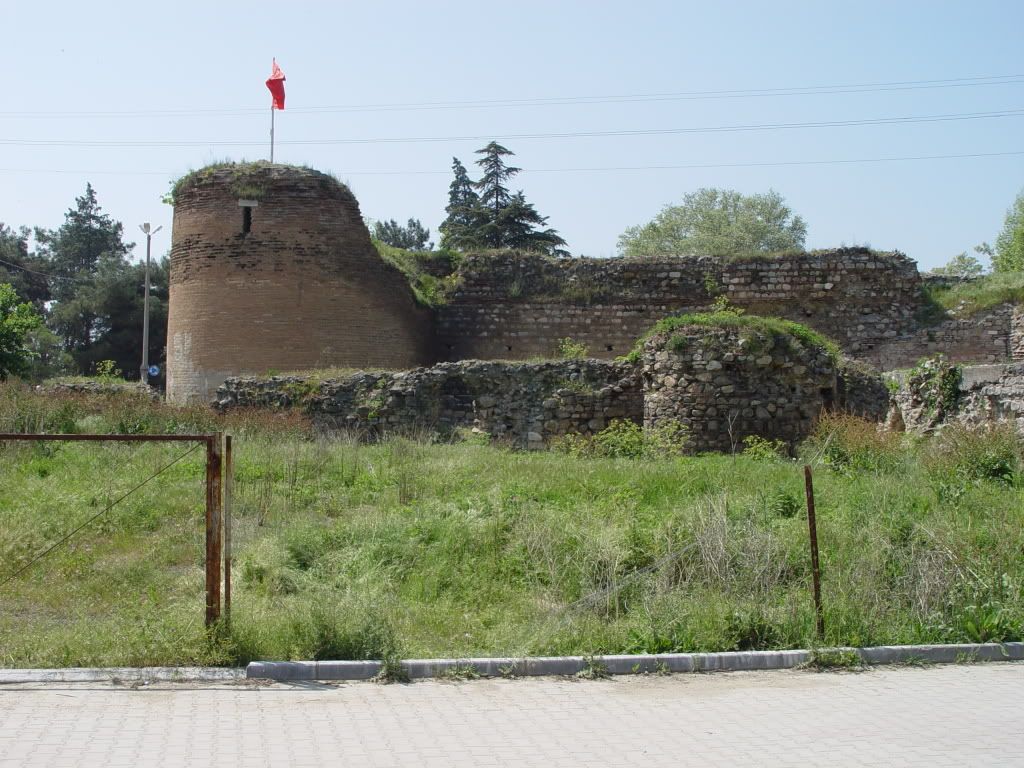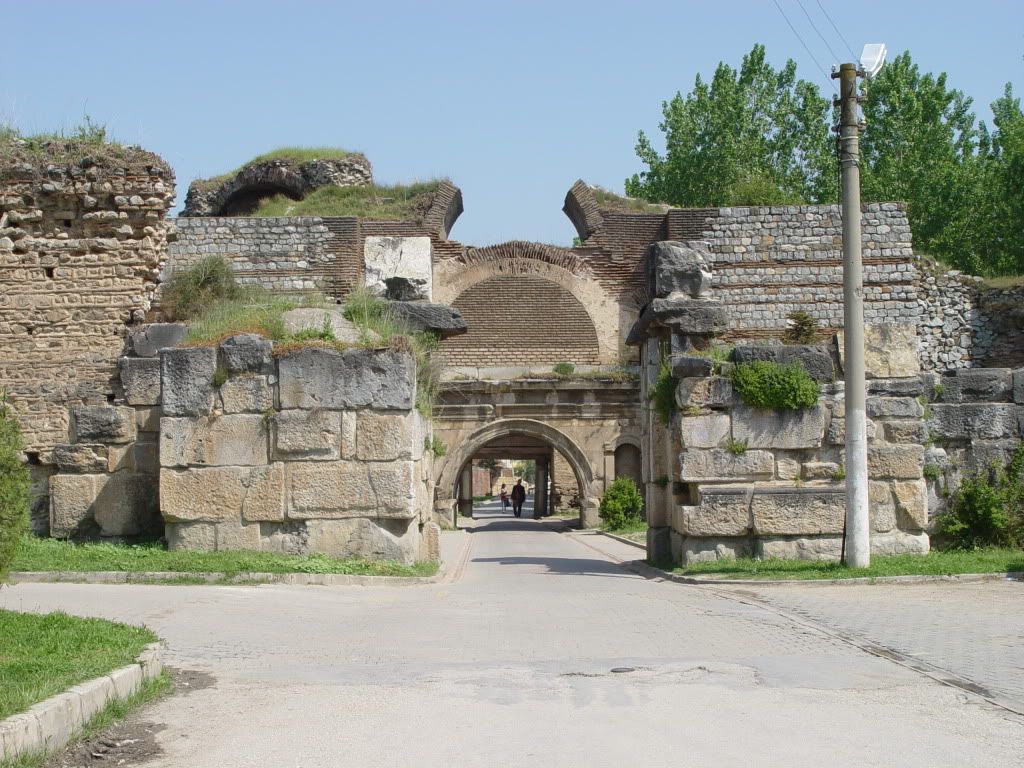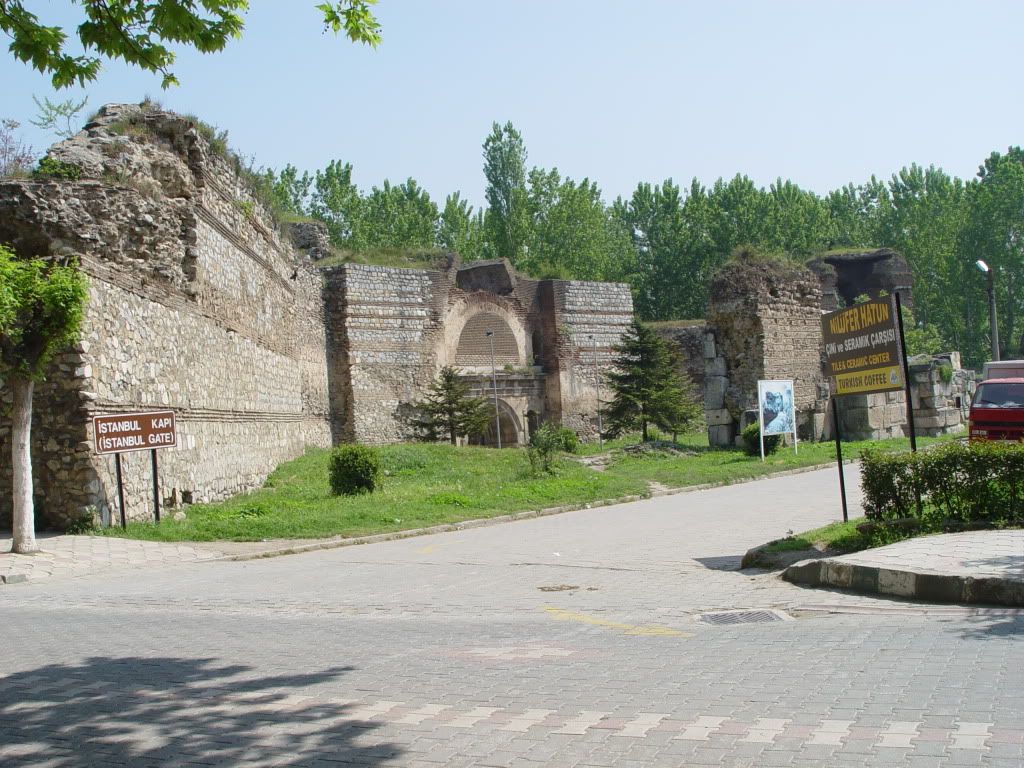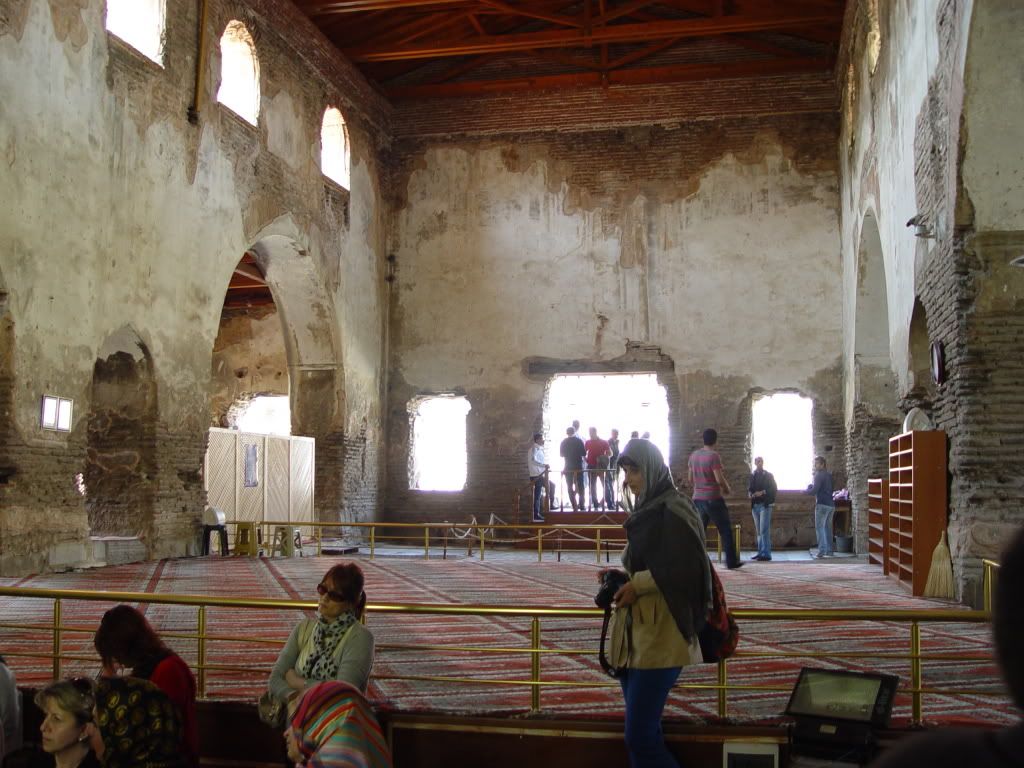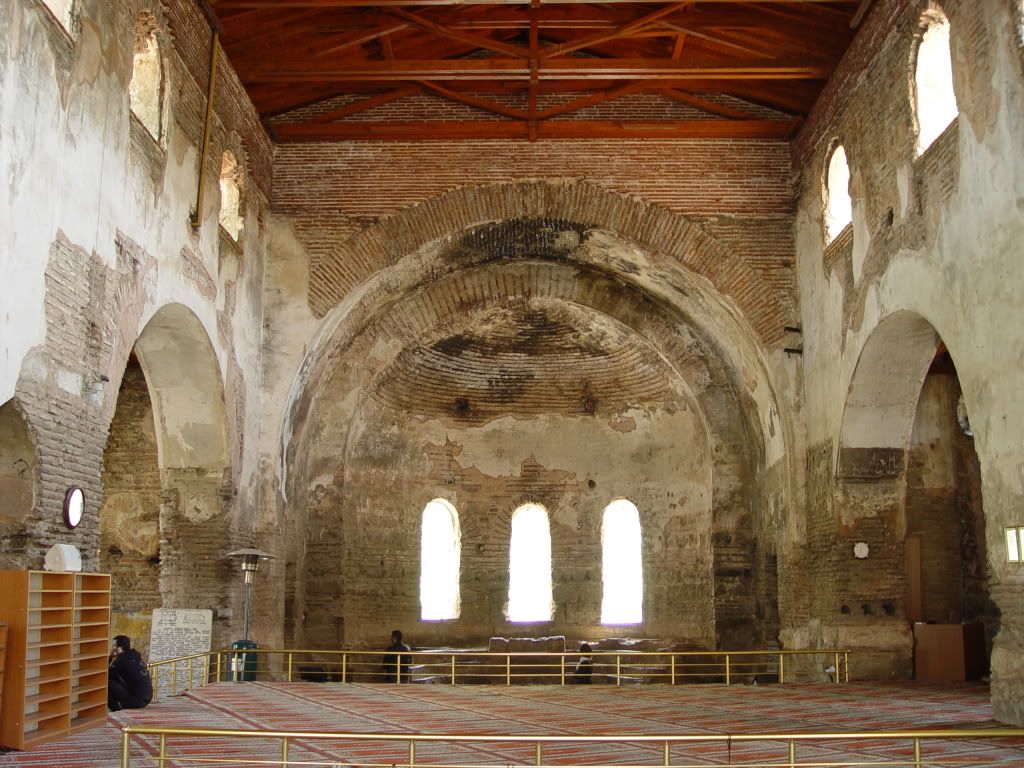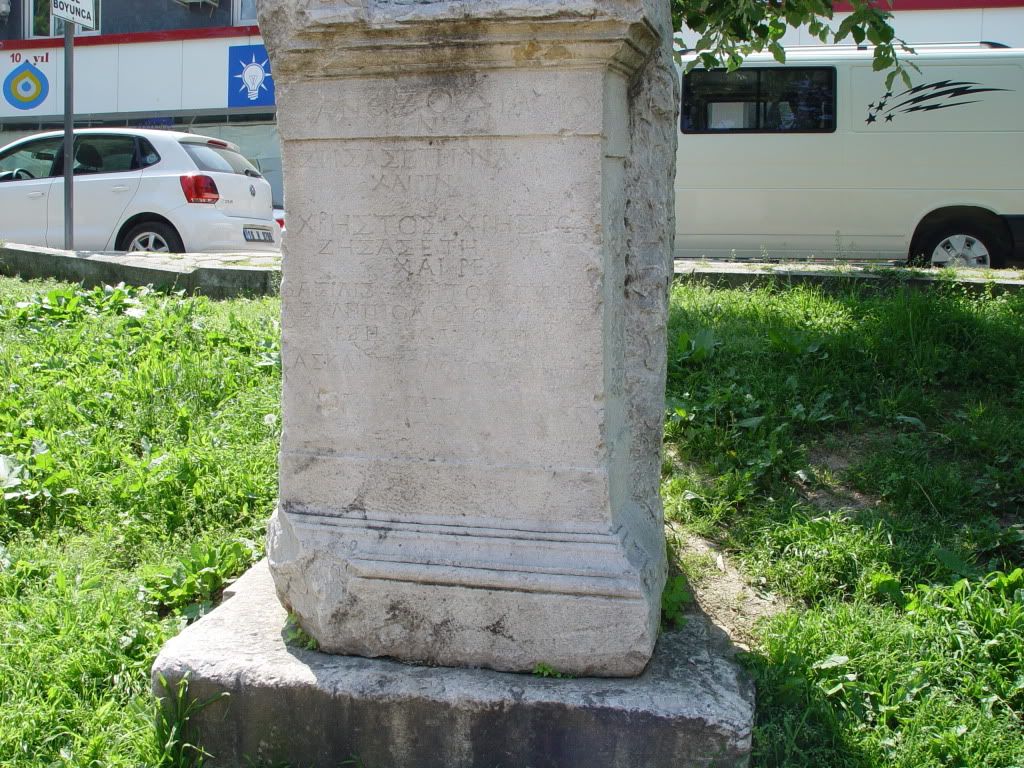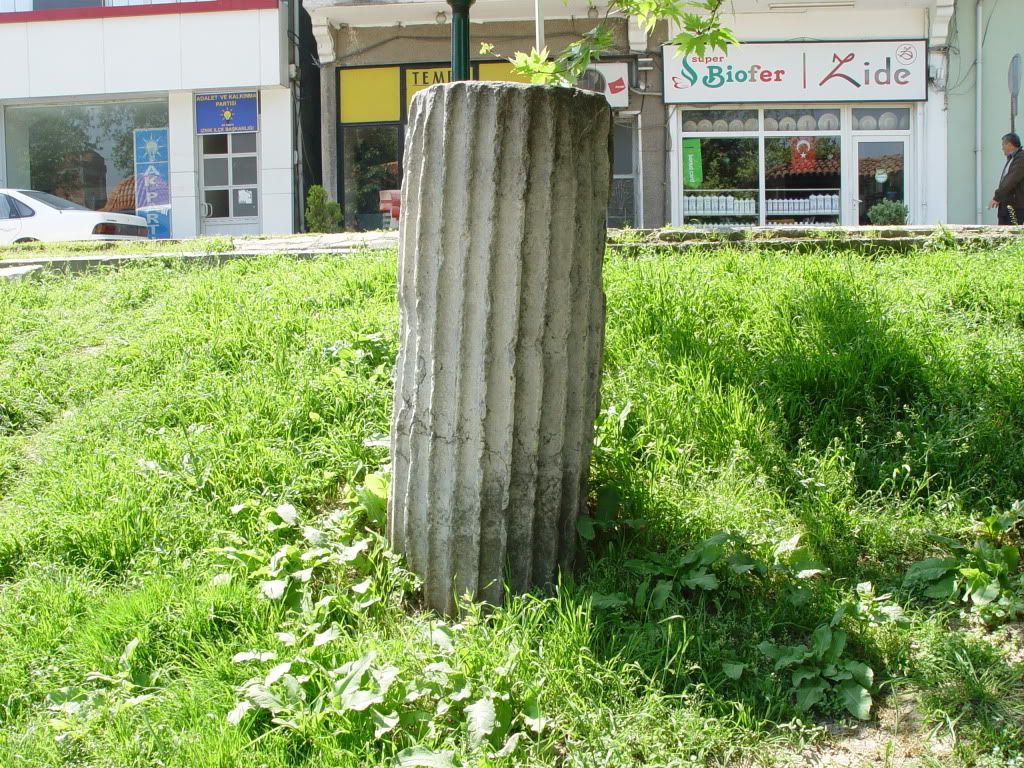F&L Filosofie & Levensbeschouwing
Een plek om te discussiëren over filosofische vragen, filosofen, religieuze vraagstukken of religie en levensbeschouwing in het algemeen.



Nicaea (Iznik) Turkije:
De stadsmuur van Nicea ( Met hellenistische en byzantijnse elementen )
En dan natuurlijke de plek waar het allemaal om gaat:
De Hagia Sophia kerk / de moskee / het museum:
Deze Hagia Sophia kerk lijkt sterk op de eerste Hagia Sophia van Istanbul.
Oude resten in de tuin van de kerk:
En voor degenen die zich afvragen waar dat meer nu is waaraan het vakantie huis van Constantijn stond:
http://nl.wikipedia.org/wiki/Eerste_Concilie_van_Nicea
De concilies van Nicaea hebben hebben ieder geval een zeer duidelijke rol gespeeld bij de totstandkoming van het orthodoxe christendom (deze term niet verwarren met de huidige term orthodox) en het uitbannen van gnosis in de vroege kerk. Zie hiervoor de http://en.wikipedia.org/wiki/Nicene_Creed de volledige impact van deze regels begrijpen is echter alleen mogelijk als je kennis van gnosis hebt.
Hoewel ik het ding vroeger uit mijn hoofd heb moeten leren als goede christen, is het belang ervan pas duidelijk geworden na het bestuderen van genosis en de historie van het vroege christendom.
Dit staat in F&L en niet in Historie vanwege de significantie voor het ontstaan van het christendom.
[ Bericht 0% gewijzigd door Daniel1976 op 05-05-2012 14:13:18 ]
http://www.livescience.com/2410-council-nicea-changed-world.htmlquote:When Constantine became the first Christian leader of the Roman Empire in the 4th century, his vast territory was populated by a hodgepodge of beliefs and religions.
Within his own young religion, there was also dissent, with one major question threatening to cleave the popular cult — as it was at the time — into warring factions: Was Jesus divine, and how?
It's hard to imagine riots in the streets, pamphlet wars and vicious rhetoric spawned by such a question, but that was the nature of things in A.D. 325, when Constantine was forced to take action to quell the controversy.
hat summer, 318 bishops from across the empire were invited to the Turkish town of Nicea, where Constantine had a vacation house, in an attempt to find common ground on what historians now refer to as the Arian Controversy. It was the first ever worldwide gathering of the Church.
The Christianity we know today is a result of what those men agreed upon over that sticky month, including the timing of the religion's most important holiday, Easter, which celebrates Jesus rising from the dead.
hristianity was young and still working out the kinks when Constantine took power over the Roman Empire in A.D. 306. Christian doctrine at the time was muddled and inconsistent, especially when it came to the central question of Jesus' relationship to God.
Jesus was as eternally divine as the Father, said one camp led by the Archbishop Alexander of Alexandria. Another group, named the Arians after their leader Arius the preacher, saw Jesus as a remarkable leader, but inferior to the Father and lacking in absolute divinity.
Supporters on both sides scrawled graffiti on town walls in defiance while bishops from across the empire entered into a war of words as the controversy simmered to a head in 324.
Fearing unrest in his otherwise peaceful territory, Constantine summoned the bishops to his lake house in Nicea on June 19, 325.
De stadsmuur van Nicea ( Met hellenistische en byzantijnse elementen )
En dan natuurlijke de plek waar het allemaal om gaat:
De Hagia Sophia kerk / de moskee / het museum:
Deze Hagia Sophia kerk lijkt sterk op de eerste Hagia Sophia van Istanbul.
Oude resten in de tuin van de kerk:
En voor degenen die zich afvragen waar dat meer nu is waaraan het vakantie huis van Constantijn stond:
http://nl.wikipedia.org/wiki/Eerste_Concilie_van_Nicea
http://nl.wikipedia.org/wiki/Tweede_Concilie_van_Niceaquote:Het Eerste Concilie van Nicea in 325 wordt het eerste oecumenisch concilie genoemd. Het werd bijeen geroepen door keizer Constantijn de Grote, tijdens het pontificaat van Paus Silvester I en was een samenkomst van 318 bisschoppen. Hier werd de officiële leer van de toenmalige Kerk en van de latere Rooms-Katholieke en Oosters-orthodoxe Kerken vastgelegd.
Hoewel niet volgens de consensus wordt door een aantal scholars aangenomen dat Nicaea een belangrijke rol heeft gespeeld bij de totstandkoming van de canon.quote:Het Concilie van Nicea II was het zevende oecumenisch concilie en werd in 787 bijeengeroepen door keizerin Irene, tijdens het pontificaat van paus Adrianus I.
De concilies van Nicaea hebben hebben ieder geval een zeer duidelijke rol gespeeld bij de totstandkoming van het orthodoxe christendom (deze term niet verwarren met de huidige term orthodox) en het uitbannen van gnosis in de vroege kerk. Zie hiervoor de http://en.wikipedia.org/wiki/Nicene_Creed de volledige impact van deze regels begrijpen is echter alleen mogelijk als je kennis van gnosis hebt.
Hoewel ik het ding vroeger uit mijn hoofd heb moeten leren als goede christen, is het belang ervan pas duidelijk geworden na het bestuderen van genosis en de historie van het vroege christendom.
Dit staat in F&L en niet in Historie vanwege de significantie voor het ontstaan van het christendom.
[ Bericht 0% gewijzigd door Daniel1976 op 05-05-2012 14:13:18 ]


Mooie plaatjes !
Op maandag 1 oktober 2012 18:45 schreef Chocolatebear het volgende:
Zei de man, terwijl hij een shaggie opstak en het gas open trok van zijn Tomos.
Zei de man, terwijl hij een shaggie opstak en het gas open trok van zijn Tomos.


De concilie van Nicaea is juist de locatie waar zeer veel voor het christendom mis ging!!
Dit was voor het eerst dat de 3-eenheid op het toneel kwam, een onbijbelse leerstelling en die is sindsdien algemeen maar aanvaard. Terwijl het bij de 1e eeuwse christenen bv totaal niet bekend was ofzo, bestond gewoon niet.
En zo zijn er vele verkeerde dingen begaan daaro waarbij de kerk zich echt afsplitste van de Bijbel als het ware.
Dit was voor het eerst dat de 3-eenheid op het toneel kwam, een onbijbelse leerstelling en die is sindsdien algemeen maar aanvaard. Terwijl het bij de 1e eeuwse christenen bv totaal niet bekend was ofzo, bestond gewoon niet.
En zo zijn er vele verkeerde dingen begaan daaro waarbij de kerk zich echt afsplitste van de Bijbel als het ware.


Negens hecht ik een waardeoordeel aan wat hier gebeurd is.quote:Op zaterdag 5 mei 2012 16:01 schreef bianconeri het volgende:
De concilie van Nicaea is juist de locatie waar zeer veel voor het christendom mis ging!!
Klopt, toch denk ik dat er in jouw ogen ook veel dingen hier goed zijn gekomen.quote:Dit was voor het eerst dat de 3-eenheid op het toneel kwam, een onbijbelse leerstelling en die is sindsdien algemeen maar aanvaard. Terwijl het bij de 1e eeuwse christenen bv totaal niet bekend was ofzo, bestond gewoon niet.
En zo zijn er vele verkeerde dingen begaan daaro waarbij de kerk zich echt afsplitste van de Bijbel als het ware.
Een vrouwelijke heilige geest, de hemelse vader en moeder van jezus zijn geen dingen die jij zult accepteren neem ik aan. Voor dat soort dingen is hier ook duidelijk een stokje gestoken.
En dan natuurlijk het antwoord op de vraag of jezus nu goddelijk was of menselijk, want als hij puur goddelijk was, dan had een middagje aan een kruis hangen ook niet veel impact natuurlijk.


Ik aanbid Maria. Voor mij is ze heilig.quote:Op zaterdag 5 mei 2012 17:02 schreef Daniel1976 het volgende:
Klopt, toch denk ik dat er in jouw ogen ook veel dingen hier goed zijn gekomen.
Een vrouwelijke heilige geest, de hemelse vader en moeder van jezus zijn geen dingen die jij zult accepteren neem ik aan. Voor dat soort dingen is hier ook duidelijk een stokje gestoken.
Geen heilige geest, dat dan weer niet. Maar meer 'heilig' als Bernadette of moeder Theresa.
Had het toch ook niet. Na een dag of wat liep hij al weer rond in de tuin.quote:En dan natuurlijk het antwoord op de vraag of jezus nu goddelijk was of menselijk, want als hij puur goddelijk was, dan had een middagje aan een kruis hangen ook niet veel impact natuurlijk.
Maar, mooie foto's.


Verwar maria niet met de moeder van jezus.quote:Op zaterdag 5 mei 2012 17:52 schreef Gia het volgende:
[..]
Ik aanbid Maria. Voor mij is ze heilig.
Geen heilige geest, dat dan weer niet. Maar meer 'heilig' als Bernadette of moeder Theresa.
maria en jozef waren zijn aardse ouders die je volgens de bijbel moet haten, want je hemelse ouders geven je leven en je aardse ouders geven je dood.
Ik heb het over Hagia Sophia (niet voor niets een vrouwelijk woord) o.a. een benaming voor de heilige geest. De moeder gods.
Damn ATON, ik word nog eens goed in gnosis.
Dan heb je het toch niet helemaal begrepen. Er wordt juist grote moeite gedaan jezus een deels menselijke natuur te geven waardoor zijn lijden meer gewicht krijgt.quote:Had het toch ook niet. Na een dag of wat liep hij al weer rond in de tuin.
Maar, mooie foto's.
Dat is nu net één van de dingen die in Nicaea besloten is


Tijd dat je terug bent uit Nicea. Petje dragen als je in de zon loopt.quote:Op zaterdag 5 mei 2012 18:00 schreef Daniel1976 het volgende:
Damn ATON, ik word nog eens goed in gnosis.


Euch, dat komt allemaal hier uit:quote:Op zaterdag 5 mei 2012 19:36 schreef ATON het volgende:
[..]
Tijd dat je terug bent uit Nicea. Petje dragen als je in de zon loopt.
http://www.amazon.com/The(...)Pagels/dp/0679724532
En P.S. zie fotoboek, ik draag tegenwoordig zo ongeveer altijd een hoed.
[ Bericht 4% gewijzigd door Daniel1976 op 05-05-2012 20:10:02 ]


De "heilige geest" wordt normaal met het geslachtloze hagion pneuma aangeduid, niet omdat het ooit als een gecastreerd wezen werd voorgesteld maar omdat het Griekse woord voor "adem" of "geest" nu eenmaal onzijdig is. Idem dito met "heilige wijsheid" en hagia sophia.quote:Op zaterdag 5 mei 2012 18:00 schreef Daniel1976 het volgende:
[..]
Ik heb het over Hagia Sophia (niet voor niets een vrouwelijk woord) o.a. een benaming voor de heilige geest.
Mooie foto's trouwens.


quote:Op zaterdag 5 mei 2012 20:22 schreef Iblardi het volgende:
[..]
De "heilige geest" wordt normaal met het geslachtloze hagion pneuma aangeduid, niet omdat het ooit als een gecastreerd wezen werd voorgesteld maar omdat het Griekse woord voor "adem" of "geest" nu eenmaal onzijdig is. Idem dito met "heilige wijsheid" en hagia sophia.
Mooie foto's trouwens.
http://www.suppressedhistories.net/articles/sophia.htmlquote:The ancient Hebrew name for Wisdom is Khokhmah, a feminine noun. In Jewish scripture, it was Khokhmah who personified the female Divine. She is understood as an emanation of God, yet she resonates with the Hebrew Goddess who is otherwise assailed in the Bible, especially Asherah, she of the sacred Tree. Proverbs 3:18 calls up an image of Khokhmah that originates in the oldest core of Jewish culture: “She is a Tree of Life to all who lay hold of her.”
The Book of Wisdom of Solomon, written by Alexandrian Jews in the Hellenistic era, renames Khokhmah as Sophia, the Greek word for Wisdom. In this text, as Long points out, Sophia “takes over the powers and function of God” and the creation story is told using the word “she.” The ancient author is careful to qualify this audacity by describing Wisdom as God's breath and emanation, but still praises her at length in her own right as “holy” and “all-powerful”:
The syncretism of Judaic, Egyptian, Hellenistic and Persian traditions gave rise to Gnosticism, a name which arose directly from an emphasis on inner knowing. Until the discovery of the Nag Hammadi scrolls, what was known of the Gnostics came mostly from their sworn enemies, the institutional clergy. When church patriarchs selected the books that became the canonical christian bible, they rejected some of the earliest texts, Gnostic scriptures. Among these excluded scriptures were writings that pictured Wisdom as a divine, creative female presence.
The Goddess was still well-loved in Egypt, whose ancient religion exerted a tremendous influence on early Gnostic philosophy. The Gospel of Thomas retains an invocation from ancient litanies of Auset: Come, lady revealing hidden secrets... Aretalogies of Isis made their way into several Gnostic scriptures, as Great Isis continued to be syncretized with Judaic wisdom traditions of Khokhmah under Hellenistic names.
The Gnostic scripture Eugnostos the Blessed hails the all-wise Sophia, Genetrix. It was she, says the Origin of the World, who created great luminaries and all of the stars and placed them in the heaven so that they should shine upon the earth. This Gnostic passage echoes the Isis Aretalogy of Cyme: I divided earth from heaven, I created the ways of the stars...
Other Egyptian Gnostic texts name the Divine Female as Ennoia (Thought), Pronoia (Forethought) or Protennoia (Primal Thought), Pistis (Faith), Sige (Silence), Eidea (Image, Idea), or Charis (Grace). These titles are often used interchangeably with Sophia. Several texts address the goddess as Arche (beginning), following the Hebraic representation of Wisdom as Reshiit in the Palestinian Targum and the Samaritan Liturgy. [Arthur, 65, 55, 61; Long, 87ff]


Nee hoor, is vrouwelijk.quote:Op zaterdag 5 mei 2012 20:22 schreef Iblardi het volgende:
[..]
De "heilige geest" wordt normaal met het geslachtloze hagion pneuma aangeduid, niet omdat het ooit als een gecastreerd wezen werd voorgesteld maar omdat het Griekse woord voor "adem" of "geest" nu eenmaal onzijdig is. Idem dito met "heilige wijsheid" en hagia sophia.
Mooie foto's trouwens.


quote:Op zaterdag 5 mei 2012 20:50 schreef Daniel1976 het volgende:
[..]
Zo'n zonnesteek heb ik toch nog niet hè


Sophia bedoel je? Ja, maar dat is dus een zuiver grammaticale kwestie. Veel abstracta zijn nu eenmaal vrouwelijk. En sophia is ook niet een heel bijzonder of zeldzaam woord. (Zie hier.)quote:
Als ze nou hagia gnosis had geheten, dán was het pas interessant geweest...


Aya Sophia (Grieks: Αγία Σοφία; "heilige wijsheid", Turks: Ayasofya) is vrouwelijk. De rest is gebakken lucht.quote:Op zaterdag 5 mei 2012 21:42 schreef Iblardi het volgende:
[..]
Sophia bedoel je? Ja, maar dat is dus een zuiver grammaticale kwestie. Veel abstracta zijn nu eenmaal vrouwelijk. En sophia is ook niet een heel bijzonder of zeldzaam woord. (Zie hier.)
Als ze nou hagia gnosis had geheten, dán was het pas interessant geweest...
Ho ja, en nog dit: De Goddelijke Wijsheid haar naam was Astarte en de echtgenote van JHWH in Salomon's tijd.


Elane leerde me ook nog iets over de moeder van jaweh.quote:Op zaterdag 5 mei 2012 21:48 schreef ATON het volgende:
[..]
Aya Sophia (Grieks: Αγία Σοφία; "heilige wijsheid", Turks: Ayasofya) is vrouwelijk. De rest is gebakken lucht.
Ho ja, en nog dit: De Goddelijke Wijsheid haar naam was Astarte en de echtgenote van JHWH in Salomon's tijd.
Die op een gegeven moment maar ergens anders ging kijken.
Met als aanwijzing in het OT dat god jaloers is, terwijl hij volgens het reguliere OT geen andere goden heeft om jaloers op te zijn.


Precies.quote:Op zaterdag 5 mei 2012 21:48 schreef ATON het volgende:
[..]
Aya Sophia (Grieks: Αγία Σοφία; "heilige wijsheid", Turks: Ayasofya) is vrouwelijk. De rest is gebakken lucht.
Over gebakken lucht gesproken...quote:Ho ja, en nog dit: De Goddelijke Wijsheid haar naam was Astarte en de echtgenote van JHWH in Salomon's tijd.
|
|





